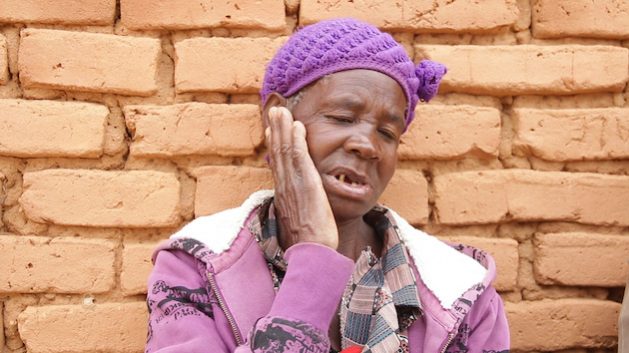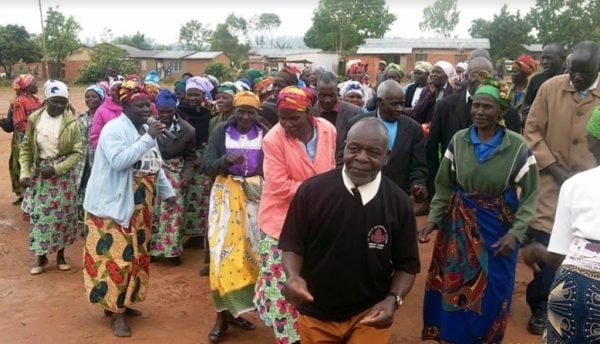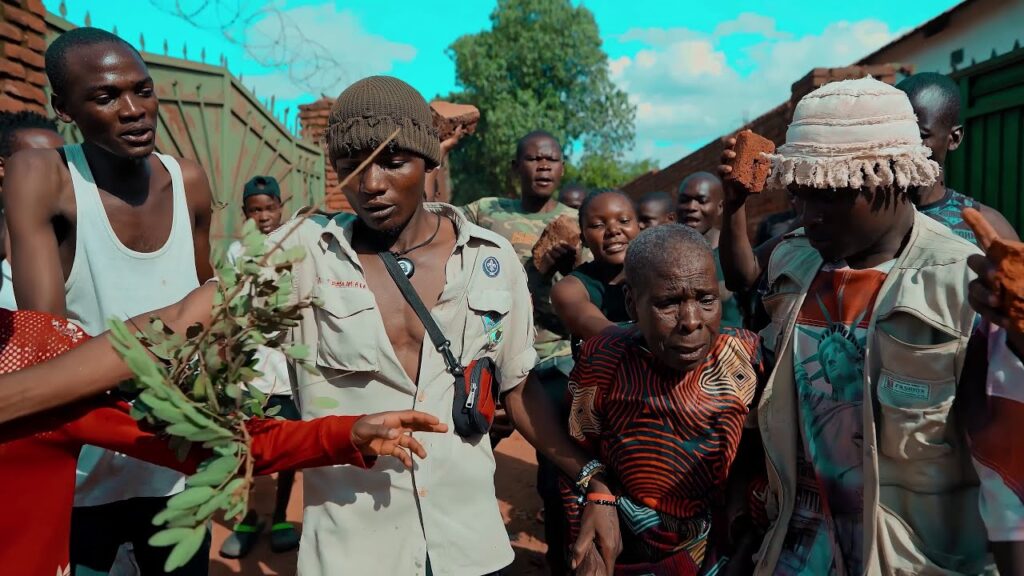It is all in his stage moniker, Saint Realest. And in real life, he is indeed a real saint.
He is a musical genius and an artistic saint and one of the realistic few among the flock of singers and performers in the South-easten African nation and a former British protectorate.
Malawi’s sensational kaleidoscopic award-winning music prodigy, leading songster, composer and songwriter, Saint Realest has craftily and creatively delved into the Bible to replicate Jesus Christ statement; “Let he who is without sin can cast the first stone,” as per the scriptures in John 8 verse 7 in his song, Ndani.
Saint Realest, the Nelia hit-maker, is a clever and an encrypted songwriter and composer who have cleverly weaved the biblical story into modern happenstances in Malawi regarding how the old people are unfairly and inhumanly treated for being falsely accused as witches.
But what did Jesus mean when He said these words and how has the Falling hitmaker, Saint interpreted the story into a song that resonates to reality on the ground.
Jesus’ statement “If any one of you is without sin, let him be the first to throw a stone at her” was uttered when he was teaching in the temple when the scribes and Pharisees brought to Him a woman who had been caught in the act of adultery, and they asked Him if she should be stoned as required by the Law of Moses.
However, it appears that they cared nothing about the woman; they were only using her to trap Jesus and in their minds, if He told them to set the woman free, they could claim He did not hold to the Law of Moses.
Similarly, if Jesus told them to stone her, they could claim He was not the Saviour; and, if He said nothing, they could claim He lacked wisdom.

Nonetheless, Jesus did not answer them immediately but stooped and wrote something on the ground and they kept pressing Him.
Finally, the Lord said, in essence, “Go ahead and stone her because that is what the Law requires. But the Law also requires that the first stone be thrown by a person who is sinless in connection with this charge.”
Arguably, there is no doubt that this woman was guilty of a capital offence and that the law required that she be stoned, but the Law also required that the guilty man be stoned as well per Deuteronomy 22 verse 22, that witnesses be produced, and that a witness begin the execution.
But the Jewish leaders came with venom against Jesus and were thwarted by their own single-minded hate – they did not produce the guilty man – and, they were unwilling or unable to produce the required witnesses.
We do not know what Jesus wrote, but, after He wrote a second time, the Jews left one by one, from the oldest to the youngest, without saying another word and Jesus then set the woman free with a warning to her to sin no more.
From this passage we learn that we do not accuse others unless we first thoroughly search our own hearts and minds to make certain that we are pure in every possible aspect as elucidated in Matthew 7 verse 3.
Also, we learn from this story that if we must admonish someone, for whatever reason, we should do so as instructed in Scriptures and that we must always look to God’s glory and never cause unnecessary harm to others as explained in Matthew 18 verse 15.

In the song, Ndani, in which the Una composer is featuring a level-up Afro-gospel hip-hop artist, Suffix, the silky-smooth voice songster calls out the toxic behaviour of admonishing and berating old people accusing the elderly of witchcraft and sorcery and in the end mistreat and abuse them to death.
The song questions if those that judge others if they have pure hearts and if they are sinless for them to be acting God in admonishing others.
The Afro-pop hit-song’s video places focus on a heart-breaking narrative on an elderly woman who is being accused of practicing witchcraft and being mobbed by angry community residents who burry her alive in a grave.
Saint Realest is a classic example of a great composer who can weave societal meaningful lyrics into a song not only for dance but also to send a serious message to the people.
In an in interview with Gazette Online News, the Falling hit maker said: “I felt duty bound to address an important issue as an artist. Innocent old people are victims of a societal misconception where many people believe that the elderly practice witchcraft and therefore responsible other peoples’ suffering and misfortunes.
“But this is not true. Most of these old people suffer from dementia. This is a disease that makes people forget everything in life. Some don’t even remember their own children or spouse needless to mention time of the day or the need to dress up and when when they are found naked, people think they had been out practicing witchcraft. This is unfair.”
Saint says as a nation, Malawi has a responsibility to protect the elderly and to ensure that they are well looked after.
He said: “A country’s welfare system is measured by how it looks after its children and the elderly. The elderly are the encyclopedia of wisdom and custodians of a nation’s culture and traditions while the children are the future.

“We must protect our elderly, treat them the dignity they deserve for these are the same people who looked after and cared for the people who are in the high places today. These are the people who helped built this country. We all have a social responsibility to look after these people.”
Saint, who recently visited Mayi Mbambande Home for the elderly in Malawi’s capital, where he filmed his music video for the song, Ndani in Lilongwe to dine and celebrate life with the old folks said it is every Malawian’s duty and responsibility that old people are respected, well looked after and that they are provided with their needs.
“It doesn’t have to be your parents or grandparents. All old people needs our support. We can do that by supporting organisations like Mayi Mbambande with a little something and that can go along way in sustaining these people’s lives,” he said.
In an interview, one Blantyre-based music enthusiast, MacDonald Chapangama said: “I have listened and watched to Saint’s song, Ndani and I find it to be sensibly deep and he (Saint) took time to think about it. The message is relevant and very pertinent to what is happening in our society.
“Saint is indeed a saint. He has a heart of gold he cares and pays attention to what is going on in our society. He doesn’t just sing, his music speaks to the people about important issues,” said Chapangama.
Saint Realest, real name Yamikani Chikwawe, was born on 12 September 1994.
He started his music a reggae and dancehall artist in 2007 but with time he transitioned to popular music and now he is into Afro-pop and afro-RnB genres and he is country one of the biggest music icons in Malawi and across the border.

He first signed to Abstract Records and Step Up Records. His music is currently under Kutchira Entertainment.
Besides singing, Saint is also a part time Disco Jockey (DJ) and was at one point in time plying his trade as a deejaying connoisseur on mixing deck at MBC Radio 2 FM.
The Lilongwe based songster, Saint shot to fame in 2012 with his debut single ‘No Love’ which was followed by the double release of ‘Ndimalakwitsa’ and ‘One Last Kiss’ tracks the following year in 2013.
Several elderly people have lost their lives in Malawi at the hands of mobs and reports indicate that five older women were killed between January and February 2023, according to the Malawi Network of Older Persons Organisations (MANEPO), a coalition of human rights organisations in the country.
In 2022, the report says, 15 elderly women were killed and 88 harassed for various reasons, largely on accusations of witchcraft—a rise from 13 killed and 58 harassed in 2021.
MANEPO’s Country Director, Andrew Kavala, in a media interview with IPS recently described the abuses of elderly women as a scourge visiting the nation.
“As a society, we have failed our elderly. We have unjustified anger towards them. Whether driven by frustration due to survival failures, we are venting our anger on innocent people,” Kavala told IPS.
Top of the factors behind this terror is what he describes as “baseless belief in witchcraft and magic,” which, he says, some people blame for their personal misfortunes.
Law and Witchcraft
The Law in Malawi does not recognise the existence of Witchcraft.
The country, a former British colony, has in force the Witchcraft Act, which came into existence in 1911 under British colonial rule and according to the Malawi Law Commission, the legislation was enacted with the aim of eradicating what the colonialists considered as dangerous some practices such as trial by ordeal, the use of charms and witchcraft itself.
In effect, the Act assumes that witchcraft does not exist.
That being the case, it is, therefore, an offence for anyone to allege that someone practices witchcraft and it is also an offence for anyone to claim that he or she practices witchcraft.
In 2006, the government set up a Special Law Commission on Witchcraft Act to review the 1911 witchcraft law – it was in response to calls that the law is alien to the common belief in witchcraft among Malawians.
In a report, the Special Law Commission indeed found a common and strong belief in the existence of witchcraft.
“There is witchcraft or, at least, a belief in witchcraft among Malawians,” the report said, concluding, “It is not correct to argue that there is no witchcraft in Malawi for the sole reason that the practice is premised upon mere belief.”

“Consequently, the commission concludes that the existence of witchcraft should not be regarded as a doubtful but conclusive (thing),” said the Commission’s chairperson, Judge Robert Chinangwa, at a presentation of its report in 2021.
But human rights organisations trashed the recommendations of the Justice Robert Chinangwa Commission for the review of the law.
In a joint statement, the organisations said, by definition, a witch or wizard is someone who secretly uses supernatural powers for wicked purposes.
Assuming that the law is amended to criminalise the practice of witchcraft, there would be the difficult issue of evidence, they argued.
“It is a good law practice that for one to be convicted of a criminal offence, the prosecution must have proven its case beyond a reasonable doubt.
“However, witchcraft involves the use of supernatural powers. Therefore, proving the allegations would be very difficult in a court of law,” they said in a joint statement.
Belief in Witchcraft

Many people in Malawi believe in witchcraft and perhaps that is why they abuse the elderly for the witchcraft-related accusations finds itself stuck on the rough edges between strong belief in witchcraft on the one hand and, on the other, that there would be no legal proof for its existence in a court of law.
The many people’s gross belief in witchcraft is a standing block for Malawi Police Service’s efforts to clamp down on the abuses against the elderly, as per Malawi Police Service national publicist Peter Kalaya.
The police’s situation is worsened by the fact that, in most cases, incidents of abuse of older women occur in rural locations remote from the nearest police stations and according to Kalaya, this sometimes negatively affects police response to provide a swift rescue of victims and arrest perpetrators.
Kalaya says the police sometimes goes beyond the barricade to evade the treachery of the witchcraft law.
Says the Malawi Police Service national Spokesperson: “Most of the abuses older persons face fall within the general crime of mob justice such as being beaten, killed, their houses and property being burnt and being subjected to verbal insults.”

The question Saint is asking in his song, Ndani is a truth-searching question needing every Malawian citizen and resident to ponder on whether it is right for one to judge others before judging themselves.
Is it ok to remove a peck in someone’s eye before removing a log in your own eye?
The Una lyrist and silky-smooth-voiced singing sensation is simply reminding each one of us that he or she who is sinless, as per the teaching of Jesus of Nazareth, must be be the one to throw the stone.
However, according to Saint Realest, that seems impossible because everyone, according to the Bible, is born into sin, therefore, it not right to judge others, it thus better for everyone to leave judgment to God.
“Ndani ali osachimwayo?” Saint is asking.
“Saint is indeed a saint.”
MacDonald Chapangama
Blantyre-based Music enthusiast



